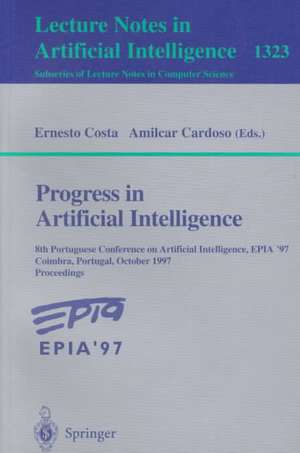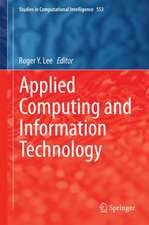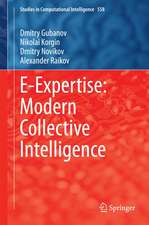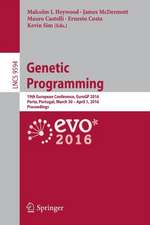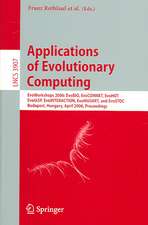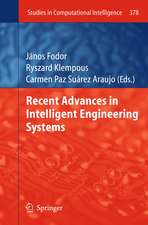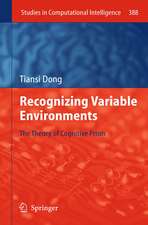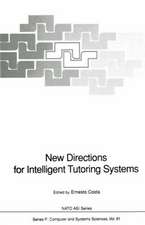Progress in Artificial Intelligence: 8th Portuguese Conference on Artificial Intelligence, EPIA '97, Coimbra, Portugal, October 6-9, 1997. Proceedings: Lecture Notes in Computer Science, cartea 1323
Editat de Ernesto Costa, Amilcar Cardosoen Limba Engleză Paperback – 19 sep 1997
The volume presents 24 revised full papers and 9 revised posters selected from 74 submissions from various countries. Also included are two full invited papers and two abstracts of invited talks. The papers are organized in topical sections on automated reasoning and theorem proving; CBR and machine learning; constraints; intelligent tutoring; knowledge representation; multi-agent systems and DAI; nonmonotonic, qualitative and temporal reasoning, and problem solving.
Din seria Lecture Notes in Computer Science
- 20%
 Preț: 1061.55 lei
Preț: 1061.55 lei - 20%
 Preț: 307.71 lei
Preț: 307.71 lei - 20%
 Preț: 438.69 lei
Preț: 438.69 lei - 20%
 Preț: 645.28 lei
Preț: 645.28 lei -
 Preț: 410.88 lei
Preț: 410.88 lei - 15%
 Preț: 580.46 lei
Preț: 580.46 lei - 17%
 Preț: 427.22 lei
Preț: 427.22 lei - 20%
 Preț: 596.46 lei
Preț: 596.46 lei -
 Preț: 381.21 lei
Preț: 381.21 lei - 20%
 Preț: 353.50 lei
Preț: 353.50 lei - 20%
 Preț: 1414.79 lei
Preț: 1414.79 lei - 20%
 Preț: 309.90 lei
Preț: 309.90 lei - 20%
 Preț: 583.40 lei
Preț: 583.40 lei - 20%
 Preț: 1075.26 lei
Preț: 1075.26 lei - 20%
 Preț: 310.26 lei
Preț: 310.26 lei - 20%
 Preț: 655.02 lei
Preț: 655.02 lei - 20%
 Preț: 580.93 lei
Preț: 580.93 lei - 20%
 Preț: 340.32 lei
Preț: 340.32 lei - 15%
 Preț: 438.59 lei
Preț: 438.59 lei - 20%
 Preț: 591.51 lei
Preț: 591.51 lei - 20%
 Preț: 649.49 lei
Preț: 649.49 lei - 20%
 Preț: 337.00 lei
Preț: 337.00 lei -
 Preț: 449.57 lei
Preț: 449.57 lei - 20%
 Preț: 607.39 lei
Preț: 607.39 lei - 20%
 Preț: 1024.44 lei
Preț: 1024.44 lei - 20%
 Preț: 579.30 lei
Preț: 579.30 lei - 20%
 Preț: 763.23 lei
Preț: 763.23 lei - 20%
 Preț: 453.32 lei
Preț: 453.32 lei - 20%
 Preț: 575.48 lei
Preț: 575.48 lei - 20%
 Preț: 585.88 lei
Preț: 585.88 lei - 20%
 Preț: 825.93 lei
Preț: 825.93 lei - 20%
 Preț: 763.23 lei
Preț: 763.23 lei - 17%
 Preț: 360.19 lei
Preț: 360.19 lei - 20%
 Preț: 1183.14 lei
Preț: 1183.14 lei - 20%
 Preț: 340.32 lei
Preț: 340.32 lei - 20%
 Preț: 504.57 lei
Preț: 504.57 lei - 20%
 Preț: 369.12 lei
Preț: 369.12 lei - 20%
 Preț: 583.40 lei
Preț: 583.40 lei - 20%
 Preț: 343.62 lei
Preț: 343.62 lei - 20%
 Preț: 350.21 lei
Preț: 350.21 lei - 20%
 Preț: 764.89 lei
Preț: 764.89 lei - 20%
 Preț: 583.40 lei
Preț: 583.40 lei -
 Preț: 389.48 lei
Preț: 389.48 lei - 20%
 Preț: 341.95 lei
Preț: 341.95 lei - 20%
 Preț: 238.01 lei
Preț: 238.01 lei - 20%
 Preț: 538.29 lei
Preț: 538.29 lei
Preț: 338.49 lei
Preț vechi: 423.11 lei
-20% Nou
Puncte Express: 508
Preț estimativ în valută:
64.77€ • 67.80$ • 53.91£
64.77€ • 67.80$ • 53.91£
Carte tipărită la comandă
Livrare economică 31 martie-14 aprilie
Preluare comenzi: 021 569.72.76
Specificații
ISBN-13: 9783540635864
ISBN-10: 3540635866
Pagini: 420
Ilustrații: XIV, 402 p.
Dimensiuni: 155 x 235 x 22 mm
Greutate: 0.59 kg
Ediția:1997
Editura: Springer Berlin, Heidelberg
Colecția Springer
Seriile Lecture Notes in Computer Science, Lecture Notes in Artificial Intelligence
Locul publicării:Berlin, Heidelberg, Germany
ISBN-10: 3540635866
Pagini: 420
Ilustrații: XIV, 402 p.
Dimensiuni: 155 x 235 x 22 mm
Greutate: 0.59 kg
Ediția:1997
Editura: Springer Berlin, Heidelberg
Colecția Springer
Seriile Lecture Notes in Computer Science, Lecture Notes in Artificial Intelligence
Locul publicării:Berlin, Heidelberg, Germany
Public țintă
ResearchCuprins
Flexible proof-replay with heuristics.- Flexible re-enactment of proofs.- Inference rights for controlling search in generating theorem provers.- A retrieval method for exploration of a case memory.- Incremental concept evolution based on adaptive feature weighting.- A 0–1 quadratic knapsack problem for modelizing and solving the constraint satisfaction problems.- An algorithm for solving systems of linear diophantine equations in naturals.- GenSAT: A navigational approach.- Timetabling using demand profiles.- Intelligent VR training.- Training strategies and knowledge acquisition: Using the same reflective tools for different purposes.- About the intended meaning of a linguistic negation.- Integration of inheritance in SNePS.- Measures of uncertainty and independence concept in different calculi.- A Multi-agent approach to first-order logic.- Modelling dynamic aspects of intentions.- Multi-agent negotiation algorithms for resources cost estimation: A case study.- Parla: A cooperation language for cognitive multi-agent systems.- Vivid agents arguing about distributed extended logic programs.- Approximate reasoning.- New results about sub-admissibility for general families of heuristic search algorithms.- Fixed point classification method for qualitative simulation.- Contextual logic of change and the ramification problem.- Temporal reasoning about actor programs.- A CLP model to the job sequencing problem.- A new approach for extracting rules from a trained neural network.- Bayesian networks, rule induction and logistic regression in the prediction of women survival suffering from breast cancer.- Controlling for unexpected goals when planning in a mixed-initiative setting.- Cooperative memory structures and commonsense knowledge for planning.- Diagonalization and typerewriting in clam.- Granularity for explanation.- Object model of intelligent tutoring shell.- Resource allocation on agent meta-societies.- Diagnostic information at your fingertips!.- Reasoning about actions with abductive logic programming.- Dimensions of embodiments: Possible futures for cognitive science (Abstract).- Machine learning meets natural language (Abstract).
